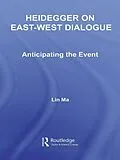This book traces a most obscure and yet most intriguing theme concealed in Heidegger's thinking and work, which has hitherto not yet been made the focus of a thorough and sustained investigation: that is, the emergence and course of Heidegger's interest in East Asian thought and of his reflection on East-West dialogue. Lin Ma covers such complex issues as Heidegger's thoughts on language, Being, technology, the other beginning, and the journey abroad, with a view to their implications for East-West dialogue. It reveals the significance of his remarks on the early Greek's confrontation with the Asiatic, and presents contextualized interpretations of his fleeting references to the topic of East-West dialogue and of his encounter with the Daodejing. Finally, it delves into "A dialogue on language" and exposes the strains and tensions that accompany Heidegger's extension of dialogue and the Same, the two notions central to his thought, to the question of East-West dialogue. In the end, Lin Ma concludes that Heidegger's fundamental concerns and philosophical orientations as articulated in terms of the history of Being and the other beginning have restricted him from engaging more seriously with the irresolvable and yet enduring issue of East-West dialogue.
Zusammenfassung
Social Movements, Law and the Politics of Land Reform investigates how rural social movements are struggling for land reform against the background of ambitious but unfulfilled constitutional promises evident in much of the developing world.a Taking Brazil as an example, it unpicks the complex reasons behind the remarkably consistent failures of its constitution and law enforcement mechanisms to deliver social justice. Using detailed empirical evidence and focusing upon the relationship between rural social struggles and the state, the book develops a threefold argument: first, the inescapable presence of power relations in all aspects of the production and reproduction of law; secondly their dominant impact on socio-legal outcomes; and finally the essential and positive role played by social movements in redressing those power imbalances and realising law's progressive potentialities.
Inhalt
Introduction Chapter One Heidegger's Asian Connection Chapter Two Language and Being: Central Themes Chapter Three Philosophy, the Ge-stell, and East-West Dialogue Chapter Four The Journey Abroad and "The Few Other Great Beginnings" Chapter Five The Early Greeks' Confrontation with the Asiatic Chapter Six Heidegger's Encounter with the Daodejing Chapter Seven East-West Dialogue and the Question of Language Chapter Eight Japanese Themes in "A Dialogue on Language" Chapter Nine Do We Have Our Eyes on the "Same"? Conclusion
